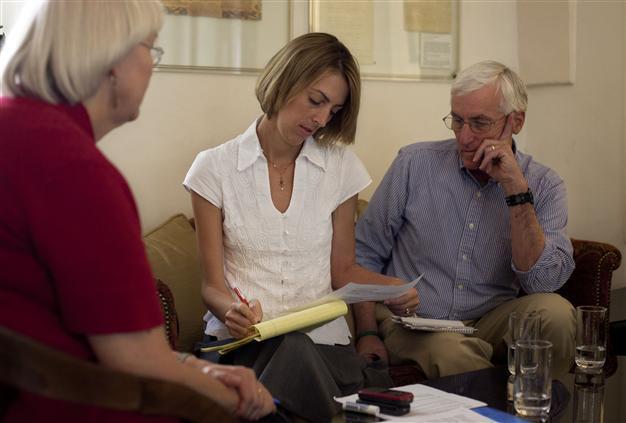Corrie family 'deeply troubled' over Israel ruling
HAIFA - Agence France-Presse

Cindy, left, and Craig Corrie, right, the parents of Rachel Corrie, a pro-Palestinian activist who was killed by an Israeli bulldozer in Gaza in 2003, sit together with their daughter Sarah, during an interview with the Associated Press in Jerusalem, Sunday, Aug. 26, 2012. AP photo
The mother of US activist Rachel Corrie, who was killed by an Israeli bulldozer in 2003, said the family was "deeply troubled" after a court found the Israeli army was not responsible for her death.
And a British peace activist who witnessed her death first hand, insisted it was "inconceivable" that the driver of the bulldozer which crushed her to death in southern Gaza, did not see her. Cindy Corrie said the family was "deeply saddened and deeply troubled" over the verdict and insisted that her daughter's death could and should have been avoided.
"We believe that Rachel's death could and should have been avoided," said the white-haired American, her voice breaking with emotion. "We knew from the beginning that a civil suit would be an uphill battle." Israel, she said, operated "a well-heeled system to protect the military." "This was a bad day, not only for the family, but a bad day for human rights, for humanity, for the rule of law and for the country of Israel," she added.
Eyewitnesses said the 23-year-old activist was killed by a military bulldozer in Rafah in the southern Gaza Strip on March 16, 2003 where she acted as a human shield with a group of pro-Palestinian activists from the International Solidarity Movement to prevent a house demolition.
In his verdict, Judge Gershon said the driver of the bulldozer did not see her and that her death was "the result an accident she bought upon herself." Tom Dale, a fellow ISM activist who was 10 metres away when Corrie was crushed, said the verdict reflected a "long-standing culture of impunity" for the Israeli army, and insisted it was not possible that the driver did not see her.
"On 16 March 2003, Rachel could not have been more visible: standing, on a clear day, in the open ground, wearing a high-visibility vest," he said in a statement emailed to AFP.
"Whatever one thinks about the visibility from a D9 bulldozer, it is inconceivable that at some point the driver did not see her, given the distance from which he approached, while she stood, unmoving, in front of it," he said. "As I told the court, just before she was crushed, Rachel briefly stood on top of the rolling mound of earth which had gathered in front of the bulldozer: her head was above the level of the blade, and just a few metres from the driver." Anyone familiar with the situation in the occupied Palestinian territories "may not be surprised by this verdict, which reflects a long-standing culture of impunity for the Israeli military, but we should be outraged." Corrie's father Craig, a veteran of the Vietnam War, expressed similar sentiments. "We've seen from the highest levels of the military that they thought they could kill people on that border with impunity," he told reporters.
The family have vowed to appeal the verdict to the Supreme Court, their lawyer said.
